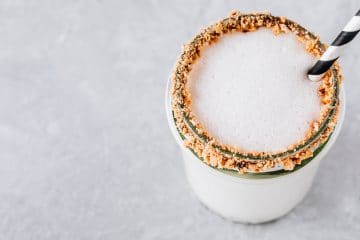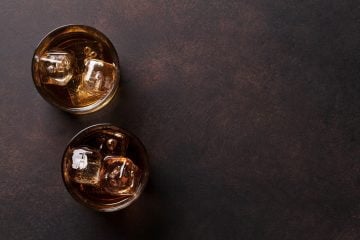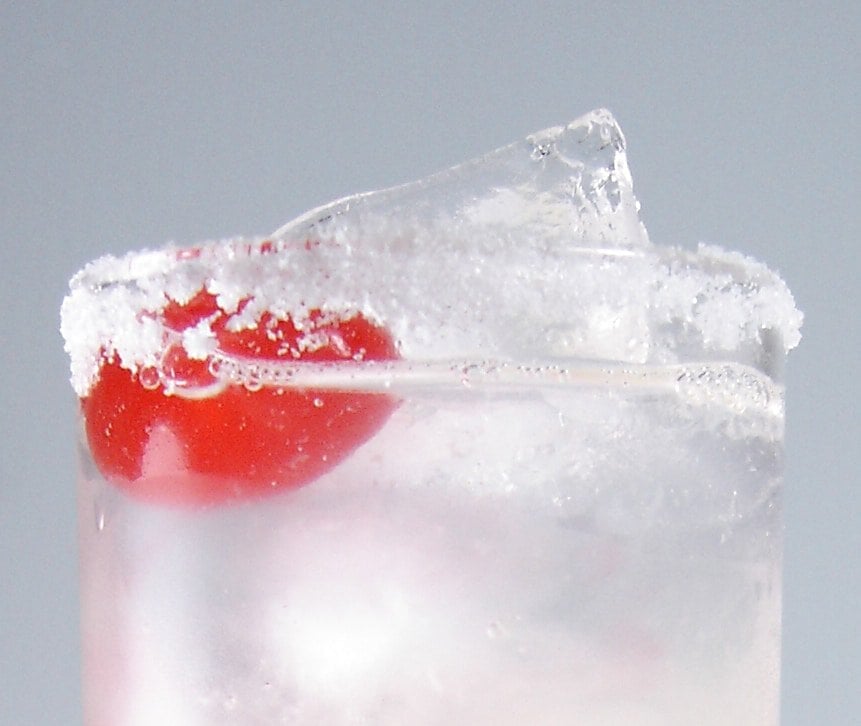Lately, cocktails have been in a renaissance. There has also been an increased interest in making them a culinary equal. Molecular mixology is one of those trends that is being mirrored from the kitchen because molecular gastronomy is the food equivalent. The basic idea, about both of these techniques, is to apply scientific analysis and techniques to cooking and mixing. On the kitchen side, it is creating unique food combination’s and on the bar front, there hasn’t been a lot done yet, mostly working with foams and gels to create unique drink textures and flavours.
To get a better idea of what molecular mixology is all about, we should look at the inspiration for it, which is molecular gastronomy. One area of molecular gastronomy is combining foods will similar chemical compositions. If one ingredient has high levels of amines or aldehydes then they should be combined with other ingredients that contain high levels of amines or aldehydes. Many times the combination’s are not intuitive or obvious. For example, the Fat Duck, a Michelin three-star restaurant, combines oysters and passion-fruit jelly as one dish, where as another dish combines spice bread ice cream and crab syrup. Odd combination’s, but supposedly they taste very good together.
Here’s a type of question that molecular gastronomy would look at; Should you salt meat before or after you cook it? The reason for this questions is that if you salt meat prior to cooking, the salt will pull water to the surface (osmotic effect), where it will evaporate faster because it is exposed to direct heat. As the water evaporates, the salt will stay concentrated and pull more water to the surface, eventually drying out the meat. This is good for some things (roasts), bad for others (steaks and burgers). If you want crispy skin, salting is ok, but there are also better molecules for this, such as the sugar maltose, which is used on the skin of Peking Duck to make it crispy. So if you are cooking a particular dish, a molecular gastronomist would research the scientific advantages, or disadvantages, of the cooking technique.
The basic idea is to understand what is going on when you cook or better understand the foods you are working with, so the pairing can be done on a molecular level, as opposed to a historical or traditional level. This type of cooking is quite complicated. First, you need to know some chemistry and physics, and then you need to do a lot of research on the compounds in the foods you are working with. For in-depth analysis, you would have to have a lab and probably a Fourier Transform Infrared Spectrometer and Mass Spectrometer. Luckily, I’ve used both of these and many other pieces of analytical equipment, so I can understand the ideas, but most people haven’t. Once you’ve analyzed your ingredients, you could then start creating unique combination’s. This is not something most people are going to do for basic Molecular Mixology.
Molecular Mixology
Molecular mixology, so far, is just being developed and the principals are a little more basic. The first example of molecular mixology would go back many, many years and would be the layering of drinks (density and viscosity), so the pousse cafe was probably the first example of the principal. Currently, it looks like molecular mixology is mostly working with the physical properties of drink. This is done by making foams, gels and mists, looking at vapour concentrations and using an appropriate glass, determining cooling properties with ice and also applying heat to caramelize sugars. Some of these creations border between food and drink, much like a Bose-Einstein condensate, which is a unique state of matter. Is a foam a food or drink?
The one area where there will be conflict is the natural vs synthetic argument. In the lab I could distill or even create amazingly unique flavours, I can do that behind the bar too. But, if molecular mixology is going to be true to the principal, then it is molecules we will be working with, and many people perceive that to be “synthetic” or “unnatural”. The reality is that most things in the universe are natural, from an atomic standpoint. Humans are smart, but we didn’t create the universe, so almost everything is natural.
Here’s an example; if you extract the albumen protein from an egg white, and then dehydrate that protein to store it for an extended period, does that make it synthetic or unnatural? Does it only become unnatural when it is rehydrated and added to a Ramos Gin Fizz? From the standpoint of molecular mixology, this is a perfect solution to getting the chemical compound needed to create a good stable foam. From a culinary standpoint, you would be missing all of those “extra” compounds that add flavour and texture. When I read about molecular mixology, I see a chemistry or physicists approach, which, in the lab, means working with pure components or specific physical conditions to create a new and unique compound or solution. It’s not unnatural, just very precise in what we work with.
There is some dubious hoodo-voodo going on with some of the molecular mixology stuff, or at least from my perspective as a chemist. Foods and drinks contain thousands and thousands of unique compounds, and even if they contain similar compounds, there might be compounds that react to form other less desirable combination’s when combined. For a lot of this, it will go back to trial and error with flavours. Also, everyone has different tastes so a lot of this will be subjective. But out of a thousand failed experiments, there will always be one or two significant discoveries. This is exactly what science is, trial and error.
The true area where molecular gastronomy and mixology will shine is in applied techniques and methods. Using science to perfect cooking is a sound idea. For the most part, I like the principal of science and food, I think it makes a lot of sense. In the future, I will see what I can do to combine my chemistry and bartending experience.
Liked this post? Check out how to layer a shooter.




